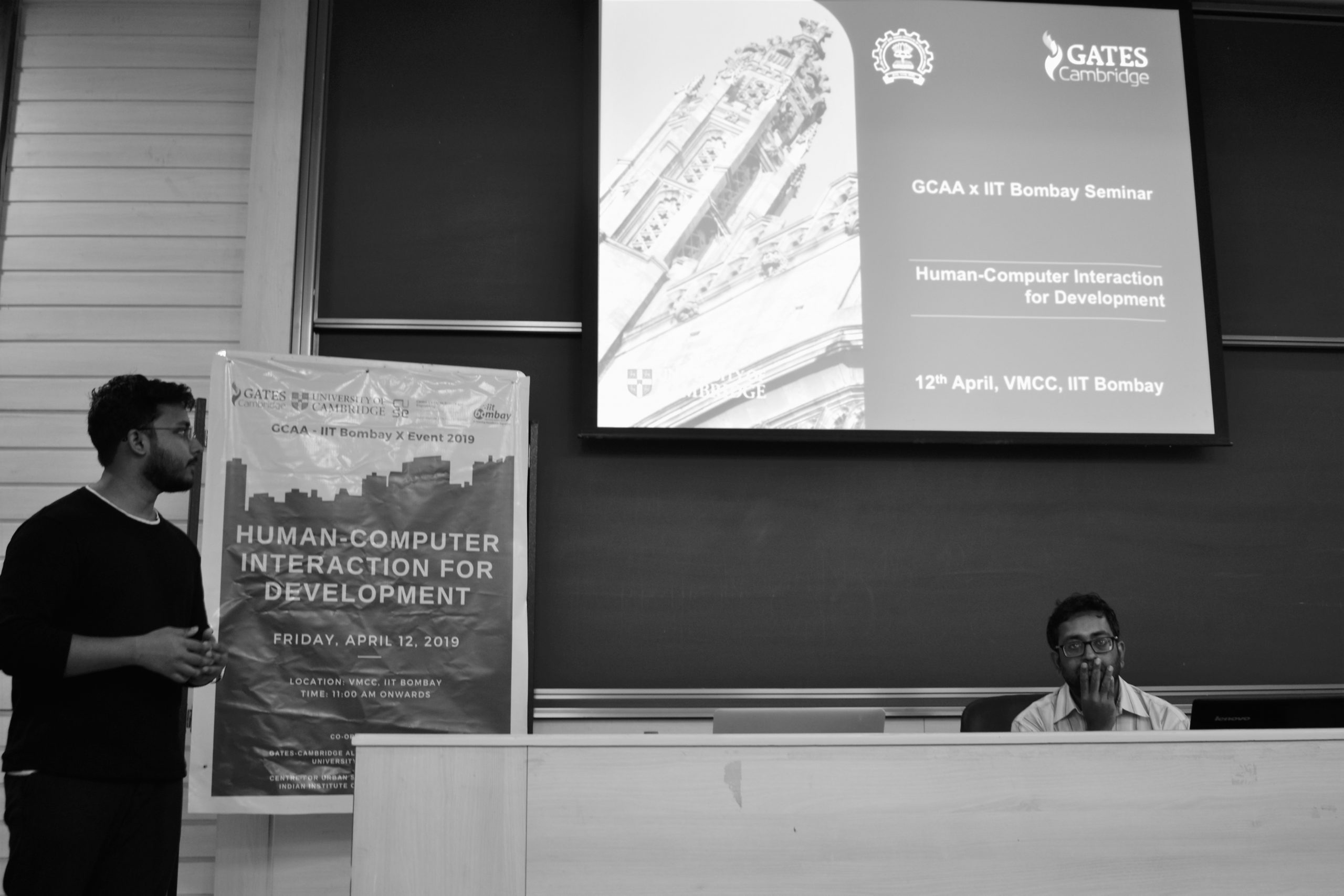
A recent Gates Cambridge seminar connected alumni and experts in Human Computer Interaction.
The event was very successful and the attendees had a great time contemplating the interdisciplinary applicability of HCI technology.
Ramit Debnath
Nearly 100 people attended a recent Gates Cambridge event in Mumbai on Human Computer Interaction [HCI] for development.
The event was held at the Indian Institute of Technology Bombay and was designed to connect Gates Cambridge alumni with the leading experts and interdisciplinary researchers on urban science, futuristic agriculture and energy technologies.
The seminar, which took place on 12th April, was organised by Gates Cambridge Scholar Ramit Debnath [2018], who is based at the Behaviour and Building Performance Group at the University of Cambridge, and the Centre for Urban Science and Engineering (CUSE), Indian Institute of Technology in Mumbai.
It explored how HCI technologies can enhance the quality of life of people living in extreme poverty or in resource-constrained settings. It was an interdisciplinary event that engaged leading researchers from urban science and engineering, product design and manufacturing, precision agriculture technologies and smart-energy management solutions for buildings.
The event began with a keynote speech by Gates Cambridge Scholar Dr Pradipta Biswas [2006] who described the role of HCI in analysing visual and auditory perception, rapid aiming movement and problem-solving strategies that can make user interfaces in modern electronic devices accessible and intuitive to elderly and disabled users.
The next keynote speaker was Dr Ronita Bardhan, who heads the Sustainable Design Group at Indian Institute of Technology Bombay. She demonstrated how HCI in urban planning can help in designing heat-stress resilient urban spaces in the overcrowded cities of the Global South. She said: "Mumbai has one of the highest numbers of homeless people in the world. They sleep on the street and during summertime, the daytime temperature can cause heatstroke, especially for the children and elderly. We studied the hazard level of land surface temperature across the city to derive solutions to prevent heatstroke among the people living on the streets. HCI technologies have helped us in developing sensors that can avoid heatstroke by reporting land surface temperature to the urban planners. We see a lot of potential in HCI for sustainable urban planning, especially for the people living in poverty."
Dr Arnab Jana at the CUSE, IIT Bombay talked about his research using three-dimensional noise mapping of urban landscapes. He said: "We all know what a city looks like, but we have never listened to a city. If we listen closely, we can find sustainable solutions embedded in the city itself."
His presentation was followed by a student-led research talk on the use of HCI in farming. Rahul Raj, a PhD candidate at IIT Bombay – Monash Research Academy, spoke about his experience of using flying drones to assess the quality of vegetation. He believes farmers have always looked up in the sky for rain and that now it is time to look down from the sky for a better yield of food crops. He says this can have a long-term impact on a country’s food security in times of ever-increasing demand.
The final talk was by Mahesh Parihar, who is an HCI technologist at the Smart Energy Informatics Lab, IIT Bombay. He demonstrated how the industry is embracing HCI in designing smart homes and energy efficient solutions. He ended the seminar series with a practical note on how the IT industry currently views HCI and its unchartered market in the Global South. He said: "The industry is hungry for a skilled-HCI workforce and this demand will only increase in the coming decade."
Ramit, who spoke about the Gates Cambridge Scholarship at the start of the event, said: "The event was very successful and the attendees had a great time contemplating the interdisciplinary applicability of HCI technology. Undergraduate students were psyched about the goals of the Gates Cambridge Scholarship and its commitment to preparing leaders for a sustainable and equitable future and alumni revived some of their profound memories of Cambridge at the networking lunch."

Ramit Debnath
- Alumni
- India
- 2018 PhD Architecture
- Churchill College
With a background in electrical engineering and computational social sciences, I design collective intelligence approaches to provide a data-driven, complex system-level understanding of barriers to climate action in the Anthropocene, their interactions, and how these translate to leverage points for policy and behavioural interventions at scale. Previously, I held positions at Caltech, Cambridge Computer Laboratory, International Energy Agency, Stanford University and IIT Bombay. I received MPhil and PhD from the University of Cambridge as a Gates Scholar.
Links
https://camcid.github.io
https://www.collectivedesign.group.cam.ac.uk/team.html
https://www.linkedin.com/in/ramit-debnath-b1980a204

Pradipta Biswas
- Alumni
- India
- 2006 PhD Computer Science
- Trinity College
Pradipta Biswas is an Assistant Professor at the Centre for Product Design and Manufacturing of Indian Institute of Science. His research focuses on user modelling and multimodal human-machine interaction for aviation and automotive environments and for assistive technology. Earlier, he was a Senior Research Associate at Engineering Department, Research Fellow at Wolfson College and Research Associate at Trinity Hall of University of Cambridge. He completed PhD in Computer Science at the Rainbow Group of University of Cambridge Computer Laboratory and Trinity College in 2010 and was awarded a Gates-Cambridge Scholarship in 2006. He undertook a first degree in Information Technology at the University of Kalyani and a master degree at the Indian Institute of Technology, Kharagpur. He conducts a course on Human Computer Interaction at Indian Institute of Technology, Mandi, guest lecture at Indian Institute of Technology, Madras and was a vice chairman of ITU-T Focus Group on Smart TV.












